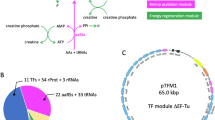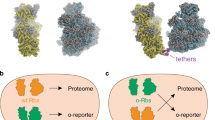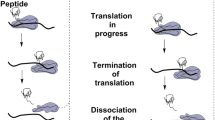Abstract
Microbiochemical reactors having two inlet ports and one outlet port were fabricated on a silicon wafer by means of anisotropic etching in order to develop a parallel and automatic experimental system for cell-free translation. Using cell-free extract prepared from Escherichia coli, we tested the reactor for the translation of polyuridylic acid and MS2 phage RNA, and found that polypeptide and protein syntheses could be proceeded according to the genetic codes on the mRNAs. It indicates that the microfabricated reactor is useful for enzymatic reactions including complicated ones like cell-free translation. We also discuss the possibility of microsystems as advanced experimental tools for not only cell-free translation but also other various biochemical and biological research fields.
Similar content being viewed by others
Author information
Authors and Affiliations
Additional information
Received: 25 January 1999
Rights and permissions
About this article
Cite this article
Nojima, T., Fujii, T., Hosokawa, K. et al. Cell-free protein synthesis in a microfabricated reactor. Bioprocess Engineering 22, 13–17 (2000). https://doi.org/10.1007/PL00009093
Issue Date:
DOI: https://doi.org/10.1007/PL00009093




